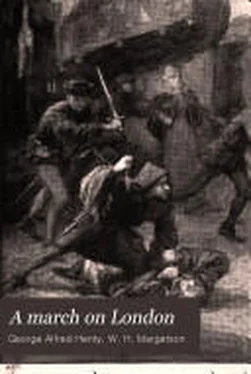“Then, too, there are the exactions of the tax-gatherers. Some day the people will rise against them as they did in France at the time of the Jacquerie, and as they have done again and again in Flanders. At present the condition of the common people, who are but villeins and serfs, is well-nigh unbearable. Altogether the future seems to me to be dark. I confess that, being a student, the storm when it bursts will affect me but slightly, but as it is clear to me that this is not the life that you will choose it may affect you greatly; for, however little you may wish it, if civil strife comes, you, like everyone else, may be involved in it. In such an event, Edgar, act as your conscience dictates. There is always much to be said for both sides of any question, and it cannot but be so in this. I wish to lay no stress on you in any way. You cannot make a good monk out of a man who longs to be a man-at-arms, nor a warrior of a weakling who longs for the shelter of a cloister.
“Let, however, each man strive to do his best in the line he has chosen for himself. A good monk is as worthy of admiration as a good man-at-arms. I would fain have seen you a great scholar, but as it is clear that this is out of the question, seeing that your nature does not incline to study, I would that you should become a brave knight. It was with that view when I sent you to be instructed at the convent I also gave you an instructor in arms, so that, whichever way your inclinations might finally point, you should be properly fitted for it.”
At fifteen all lessons were given up, Edgar having by that time learnt as much as was considered necessary in those days. He continued his exercises with his weapons, but without any strong idea that beyond defence against personal attacks they would be of any use to him. The army was not in those days a career. When the king had need of a force to fight in France or to carry fire and sword into Scotland, the levies were called out, the nobles and barons supplied their contingent, and archers and men-at-arms were enrolled and paid by the king. The levies, however, were only liable to service for a restricted time, and beyond their personal retainers the barons in time followed the royal example of hiring men-at-arms and archers for the campaign; these being partly paid from the royal treasury, and partly from their own revenue.
At the end of the campaign, however, the army speedily dispersed, each man returning to his former avocation; save therefore for the retainers, who formed the garrisons of the castles of the nobles, there was no military career such as that which came into existence with the formation of standing armies. Nevertheless, there was honour and rank to be won in the foreign wars, and it was to these the young men of gentle blood looked to make their way. But since the death of the Black Prince matters had been quiet abroad, and unless for those who were attached to the households of powerful nobles there was, for the present, no avenue towards distinction.
Edgar had been talking these matters over with the Prior of St. Alwyth, who had taken a great fancy to him, and with whom he had, since he had given up his work at the convent, frequently had long conversations. They were engaged in one of these when this narrative begins:
“I quite agree with your father,” the Prior continued. “Were there a just and strong government, the mass of the people might bear their present position. It seems to us as natural that the serfs should be transferred with the land as if they were herds of cattle, for such is the rule throughout Europe as well as here, and one sees that there are great difficulties in the way of making any alteration in this state of things. See you, were men free to wander as they chose over the land instead of working at their vocations, the country would be full of vagrants who, for want of other means for a living, would soon become robbers. Then, too, very many would flock to the towns, and so far from bettering their condition, would find themselves worse off than before, for there would be more people than work could be found for.
[Illustration: EDGAR TALKS MATTERS OVER WITH THE PRIOR OF ST. ALWYTH.]
“So long as each was called upon only to pay his fifteenth to the king's treasury they were contented enough, but now they are called upon for a tenth as well as a fifteenth, and often this is greatly exceeded by the rapacity of the tax-collectors. Other burdens are put upon them, and altogether men are becoming desperate. Then, too, the cessation of the wars with France has brought back to the country numbers of disbanded soldiers who, having got out of the way of honest work and lost the habits of labour, are discontented and restless. All this adds to the danger. We who live in the country see these things, but the king and nobles either know nothing of them or treat them with contempt, well knowing that a few hundred men-at-arms can scatter a multitude of unarmed serfs.”
“And would you give freedom to the serfs, good Father?”
“I say not that I would give them absolute freedom, but I would grant them a charter giving them far greater rights than at present. A fifteenth of their labour is as much as they should be called upon to pay, and when the king's necessities render it needful that further money should be raised, the burden should only be laid upon the backs of those who can afford to pay it. I hear that there is much wild talk, and that the doctrines of Wickliffe have done grievous harm. I say not, my son, that there are not abuses in the Church as well as elsewhere; but these pestilent doctrines lead men to disregard all authority, and to view their natural masters as oppressors. I hear that seditious talk is uttered openly in the villages throughout the country; that there are men who would fain persuade the ignorant that all above them are drones who live on the proceeds of their labour—as if indeed every man, however high in rank, had not his share of labour and care—I fear, then, that if there should be a rising of the peasantry we may have such scenes as those that took place during the Jacquerie in France, and that many who would, were things different, be in favour of giving more extended rights to the people, will be forced to take a side against them.”
“I can hardly think that they would take up arms, Father. They must know that they could not withstand a charge of armour-clad knights and men-at- arms.”
“Unhappily, my son, the masses do not think. They believe what it pleases them to believe, and what the men who go about stirring up sedition tell them. I foresee that in the end they will suffer horribly, but before the end comes they may commit every sort of outrage. They may sack monasteries and murder the monks, for we are also looked upon as drones. They may attack and destroy the houses of the better class, and even the castles of the smaller nobles. They may even capture London and lay it in ashes, but the thought that after they had done these things a terrible vengeance would be taken, and their lot would be harder than before, would never occur to them. Take your own house for instance—what resistance could it offer to a fierce mob of peasants?”
“None,” Edgar admitted. “But why should they attack it?”
The Prior was silent.
“I know what you mean, good Father,” Edgar said, after a pause. “They say that my father is a magician, because he stirs not abroad, but spends his time on his researches. I remember when I was a small boy, and the lads of the village wished to anger me, they would shout out, 'Here is the magician's son,' and I had many a fight in consequence.”
“Just so, Edgar; the ignorant always hate that which they cannot understand; so Friar Bacon was persecuted, and accused of dabbling in magic when he was making discoveries useful to mankind. I say not that they will do any great harm when they first rise, for it cannot be said that the serfs here are so hardly treated as they were in France, where their lords had power of life and death over them, and could slay them like cattle if they chose, none interfering. Hence the hatred was so deep that in the very first outbreak the peasants fell upon the nobles and massacred them and their families.
Читать дальше












